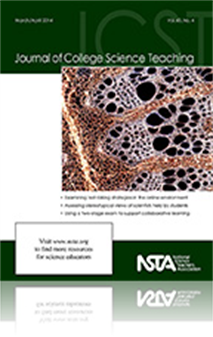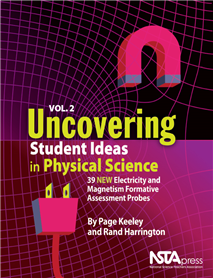All Resources
Journal Article
Career of the Month: An Interview with Biomaterials Engineer Constance Ace
This column shares interviews with professionals using science in the workplace. This month’s issue describes Constance Ace's career path to becoming a biomaterials engineer....
Journal Article
This Q&A style column provides up-to-date information on current health topics—helping students (and teachers) make healthy choices. This month’s issue discusses how to help students see beyond the myths surrounding STDs....
Journal Article
Safer Science: Don't Make Your Lab a McDonald's
This column provides best safety practices for the science classroom and laboratory. This month’s issue discusses reasons why food and drink should not be allowed in the lab....
Journal Article
Analyze your class's consumption and waste production to teach students about their environmental impact....
Journal Article
The Value of a Tree: Comparing Carbon Sequestration to Forest Products
Determine whether your local trees are better used for carbon sequestration or jet fuel....
Journal Article
Connect classroom learning and community outreach through a unit about invasive ecology....
Journal Article
Outstanding Science Trade Books for Students K–12
Discover trade books published in 2013 that cover science content, engineering, and design....
Journal Article
Greenhouse Design: An Engineering Unit
Incorporate engineering design into a lesson about grassland ecosystems....
Journal Article
Get Your Students Outside With Technology
Use the latest technology to create an interactive interpretive trail....
Journal Article
Editor's Roundtable: Walking a Thin Line
Science Scope’s editor shares thoughts regarding the current issue....
Journal Article
Everyday Engineering: UV or Not UV? That Is a Question for Your Sunglasses
This column provides an inside look at the marvels of engineering in everyday life. In this 5E learning cycle lesson students use UV-sensitive beads to test different sunglasses' lenses to determine their ability to filter UV light....
Journal Article
This column provides how-to strategies and practical advice for the science teacher. This month’s issue provides a set of questions useful for thinking about explanation and argumentation in students' talk with each other....
Journal Article
Scope on Safety: LAMP: Shining a Light on Safety
This column shares safety information for your classroom. This month’s issue discusses LAMP: an acronym for lead, asbestos, mercury, and polychlorinated biphenyls (PCBs).The article describes where in the school building each of these health hazard...
Journal Article
Scope on the Skies: Prograde and Retrograde
This column focuses on astronomy throughout the year. This month’s issue discusses the motion of planets....
Journal Article
Our World Without Decomposers: How Scary!
A fifth-grade outdoor study of essential organisms in ecosystems....
Journal Article
Exploring Nature Through a New Lens
Students use digital cameras to record evidence of the animal habitats that surround their school....
Journal Article
Examining stability and change in a local pond connects students to their environment....
Journal Article
Growing Gardens, Growing Minds
A garden project introduces plants and healthy eating....
Journal Article
The Amazing Ecology of Terrestrial Isopods
Third-grade students investigate roly-polies to learn about ecosystems....
Journal Article
Outstanding Science Trade Books for Students K–12
Discover trade books published in 2013 that cover science content, engineering, and design....
Journal Article
Editor's Note: Support for Implementation of NGSS
Science and Children’s editor shares thoughts regarding the current issue....
Journal Article
Teaching Through Trade Books: Let's Talk Trash
This column includes activities inspired by children’s literature. This month’s issue helps students focus on what trash is, which trash can be recycled, and where their trash ends up in the process....
Journal Article
The Early Years: Ecosystems, Up Close and Personal
This column discusses resources and science topics related to students in grades preK to 2. This month’s issue discusses children observing and documenting the growth of a plant from a seed to seed-production and animal interactions with the plant....
Journal Article
Formative Assessment Probes: Habitat Change: Formative Assessment of a Cautionary Word
This column focuses on promoting learning through assessment. This month’s issue discusses word usage and learning about habitat....
Journal Article
Science 101: If Energy Is Neither Created Nor Destroyed, What Happens to It?
This column provides background science information for elementary teachers. This month’s issue discusses energy....
Journal Article
Science Shorts: Is This Alive?
This column provides classic classroom activities that emphasize science process skills. This month’s issue uses place-based education to teach students the living and nonliving components of the environment....
Journal Article
Safety First: Ensuring a Safer Outdoor Experience
This column provides best safety practices for the science classroom. This month’s issue discusses safety during field experiences....
Journal Article
Methods and Strategies: Seeding Science in Elementary Schools
This column provides ideas and techniques to enhance your science teaching. This month’s issue descibes a school-university partnership that helps ensure the youngest students experience a rich science curriculum....
Journal Article
Assessment in Online Learning—It's a Matter of Time
This article reviews how students in an online Earth and Space Science course interact with various online assessments....
Journal Article
This article presents the combination of three enhanced educational approaches for training future scientists. These methods incorporate skills generally not introduced in the freshman year: student-led blackboard introductions; the writing of scient...
Journal Article
Using the Draw-a-Scientist Test for Inquiry and Evaluation
This article describes the use of the Draw-a-Scientist Test as both a model for inquiry and as a method of assessing the affective domain....
Journal Article
Examinations That Support Collaborative Learning: The Students' Perspective
The authors used surveys and classroom observations to examine student reactions to two-stage exams, where students first do the exam individually and then redo it collaboratively....
Journal Article
Metacognition: An Effective Tool to Promote Success in College Science Learning
This article describes a case study in which metacognition was introduced to undergraduate science (chemistry) classrooms.The aim of the study was to instruct educators how to incorporate metacognition in college science classrooms, and the improved ...
Journal Article
Explorations in Integrated Science
This article describes a third-year undergraduate course that focuses on multiscale modeling and protein folding and has as its primary goal the encouragement of students to integrate thinking across and beyond disciplinary boundaries....
Journal Article
The Journal of College Science Teaching’s editor shares thoughts regarding the current issue....
Journal Article
Summer research experiences have been identified as important vehicles for fostering the learning, skill development, and retention of undergraduates in the sciences. In the initiative described in this article, community college faculty and students...
Journal Article
Case Study: A Picture Worth a Thousand Words? Making a Case for Video Case Studies
This column provides original articles on innovations in case study teaching, assessment of the method, as well as case studies with teaching notes. This month’s issue discusses video case studies....
Journal Article
The authors describe a study in which an honors biology instructor implemented clickers as a mechanism for students to complete in-class quizzes....
Journal Article
This study documented the means by which STEM educators experienced the mathematics and science associated with understanding lunar phenomena. The article reports how well STEM education graduate students interacted with project-based materials as th...
Book Chapter
The purpose of this assessment probe is to elicit students’ ideas about series circuits. The probe is designed to determine what students think will happen to the brightness of light bulbs as more light bulbs are added to a circuit. This free sampl...







